Stress relieving foods: Eat these for a dose of zen
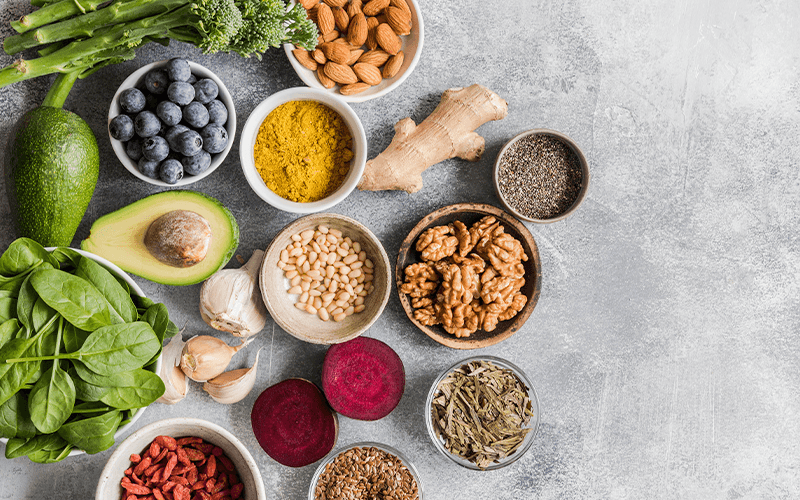 ©Olga Peshkova / 500px
©Olga Peshkova / 500px
Start unwrapping some chocolate whenever you’re stressed out? Is there any evidence that candy, chips, and other snacks actually help reduce stress? And if not – what are some real stress relieving foods?
What’s the Best Food for Stress Relief?
Stress often leaves us exhausted and frazzled. Most of us have learned that in these situations there’s usually one thing that helps: Eat something, then eat some more. There’s a range of foods people want when they’re stress eating. It might be chocolate, pizza, or maybe a glass of wine.
But in stressful situations, like so much of life, a balanced diet overall is what counts. To give your body the best possible support and enough energy to take on anything, you need certain micro- and macronutrients including protein, complex carbs, vitamins, and minerals.
How Can I Relieve Stress With My Diet?
A healthy diet is a good foundation for dealing with stress. But what parts of that diet are actually responsible for stress relief?
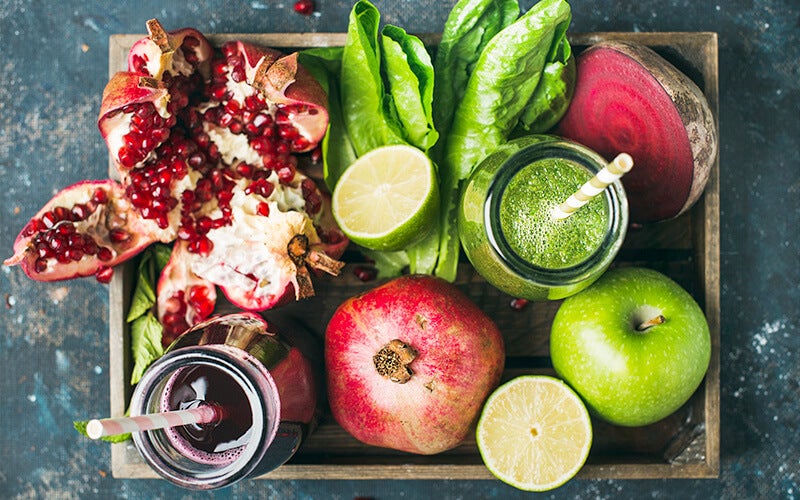
Vitamins
Instead of going to the nearest fast food chain, eat some foods high in vitamins to help reduce anxiety and relieve stress. B vitamins, including Vitamins B1, B6, and B12, are particularly important for your nervous system¹. You should also make sure you get enough Vitamin C and Vitamin E. They protect you from free radicals² so they help improve your feeling of well-being.
Minerals
Minerals are also important to pay attention to when you’re eating for stress relief. Magnesium, calcium, and potassium in particular are involved in numerous metabolic processes in the body. For example, they support normal metabolism and are important for the body’s fluid balance. In this context, minerals can combat anxiety and have a stress-reducing effect, although the research on magnesium’s direct stress-reducing effect is still inconclusive³.
Protein
You might have heard of serotonin as a kind of happiness hormone that helps manage anxiety. But in order to produce serotonin, your body needs the right basic building blocks. These include Vitamins B12 and B6, and an amino acid called tryptophan found in protein-rich foods.
Carbs
Tryptophan can only reach the brain through the blood with the help of carbs, because they trigger insulin release. This role in helping deliver tryptophan is why it’s not a bad idea to go for a few carbs when we’re feeling anxious.
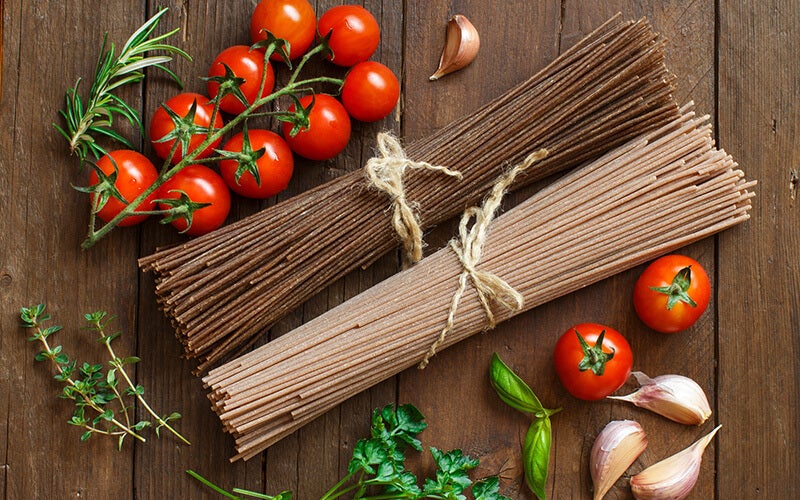
8 Foods That Fight Stress
So if you’re stressed, eating is a good idea! However, you should eat the right foods to help your body perform at its peak under stress. Ideally, these are foods that don’t make your blood sugar levels go haywire and still taste delicious. We’ve put together 8 of them for you:
Dark Chocolate
Chocolate is probably one of the top stress-eating snacks. But it’s important to know that it’s just dark chocolate with a high cocoa percentage that really helps with stress. This is because it contains tryptophan which, like we mentioned above, is involved in the production of serotonin⁴. Dark chocolate also contains less sugar than milk chocolate, so it’s better for your blood sugar levels.
Our tip: Can you put chocolate and protein together? Absolutely! Our Extra Chocolate Protein Bar not only has a low sugar content, but also 4x more protein than your average chocolate bar!
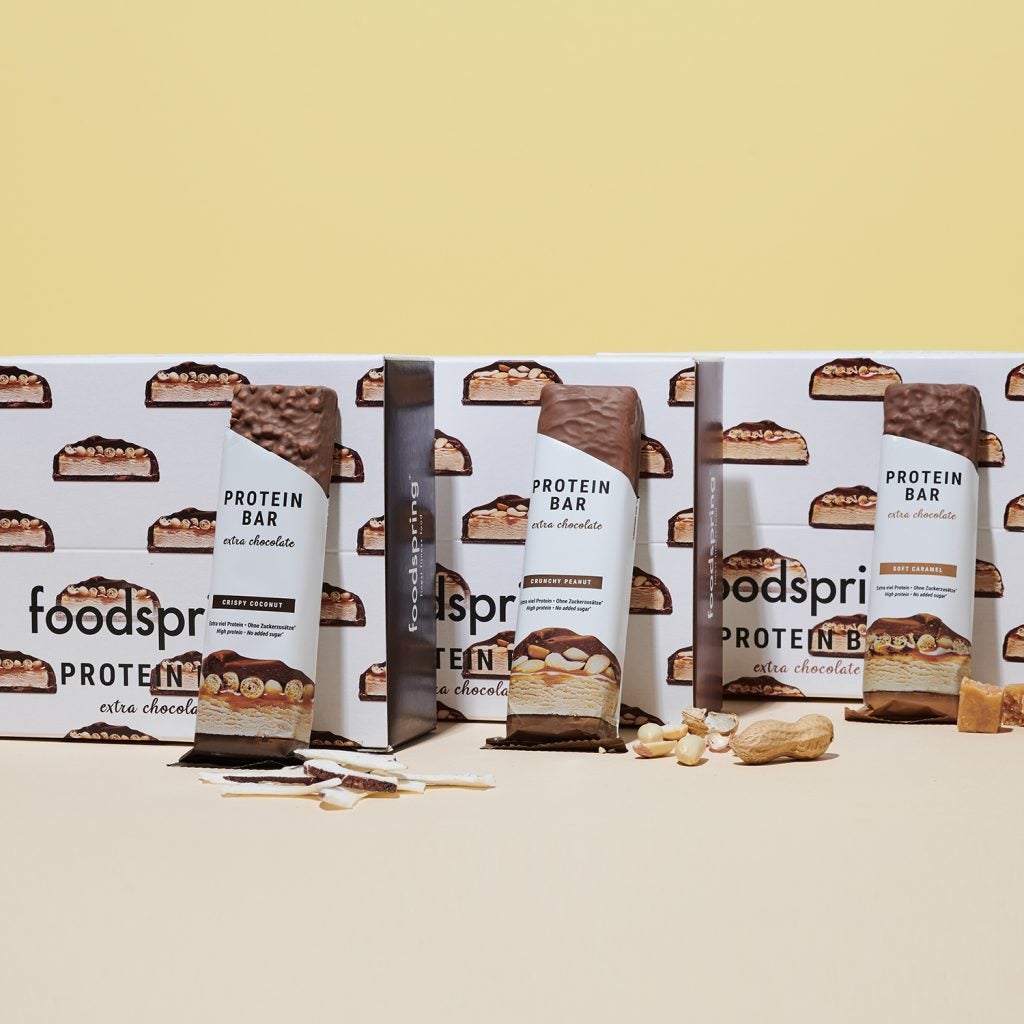
Try an Extra Chocolate Protein Bar now
Spinach
Popeye always said that spinach makes you strong! But it’s also actually true, especially for your nervous system. Because green leafy vegetables not only contain many vitamins, but also potassium, calcium, and magnesium. So you don’t lose all those important nutrients, it’s better to steam spinach instead of boiling it. You can also turn fresh spinach into a delicious smoothie. Try out our recipe for a protein shake with spinach.
Nuts
Nuts are the perfect snack against stress. With an assorted mixture of nuts, you provide your body with a healthy dose of potassium, which supports normal blood pressure levels. So even when you’re under stress you’ll keep your heart rate steady. If you like to snack on nuts, make sure they’re unroasted and have no salt or added oil.
Tip: Stress-free food to go – our Nuts and Berries mix is brimming with high-quality nuts and dried fruit – and there’s no raisins in sight! Instead you’ll find healthy goji berries, sour cherries, almonds & more.
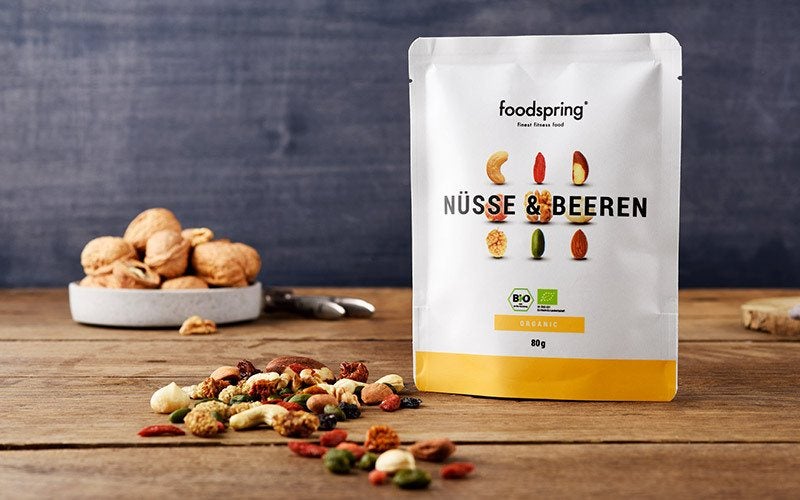
Grab your Nuts and Berries now!
Bananas
Got a bit of a sweet tooth when you’re under stress? Then a banana’s the right choice for you! Just like dark chocolate, they contain tryptophan and therefore help with serotonin production and anxiety management. In addition, bananas are rich in various minerals and Vitamin B6. This mix of minerals helps keep up the oxygen supply to your brain, so you can stay focused despite it all.
Oatmeal
These tasty grains do much more than just fill you up. In addition to healthy complex carbs, they also contain various B vitamins and minerals such as iron, magnesium, and zinc. If you want to fortify yourself with the right balance of nutrients at breakfast, prepare a quick porridge with banana and blueberries.
Our tip: Don’t like your oatmeal too chunky? Our Instant Oats are just like oatmeal, only finer. They dissolve perfectly in a shake, can be used for baking, or made into a porridge. 100% organic oats, and no additives.
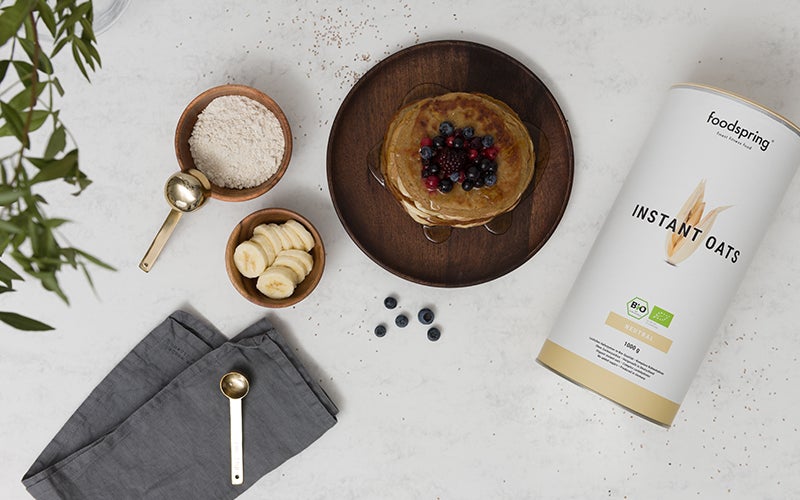
©foodspringClick here for our Instant Oats
Avocado
Avocados are not only rich in healthy fats but also in Vitamin B1, aka thiamine. Vitamin B1 is involved in our nervous system and contributes to maintaining normal metabolism and heart function as well⁵. As a small stress-fighting snack for in between meals, you can make yourself a quick avocado toast. Or how about a salad with avocado and sweet potato?
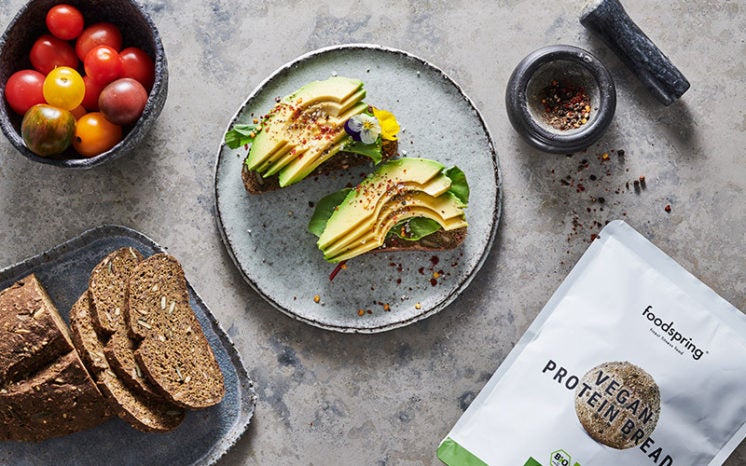
Fish
Fatty fish like salmon or sardines are chock full of omega-3 fatty acids. These fats are particularly good for you, especially in stressful situations, because they support brain functions and help maintain normal blood pressure.
Our tip: Fish isn’t your thing? Then our vegan Omega-3 Capsules will help you make sure you get enough healthy fatty acids. Instead of fish, we extract the omega-3s from algae to make a product that’s good for you and the environment as well.
Click here for our capsules with omega-3s
Eggs
Eggs are also rich in various B vitamins, especially Vitamin B12. So cook yourself an egg for breakfast for a change. Hard boiled eggs are also a great snack for in between meals.
Why Do We Feel Like Eating Sugary Foods Anyway?
But if candy and fatty fast food aren’t good for combatting stress, why do we get cravings for them? When your body is under stress, it demands quick energy because adrenaline is released. This hormone-induced reaction used to be essential for our survival. Danger meant a lot of stress for people in hunter-gatherer societies: This adrenaline kick enabled our ancestors to run away quickly and escape to safety.
Running away to safety consumes a lot of energy, so once the stressful situation is over, your appetite wakes up and you’re suddenly hungry for carbs that are quick to digest.
Nowadays, we satisfy those cravings with snacks like chips or chocolate. Although these are quick and easy calories, they make our blood sugar levels rise quickly, and then fall just as quickly.

Strengthen Your Resilience to Cope With Stress
Chocolate, oatmeal, nuts… the list of delicious foods which help anxiety is long. But of course it’s not just about food! There’s other things that can also relieve stress, such as:
- Relaxation exercises
- Yoga
- Sport
- Stretching exercises
- Power naps
And always make sure that you drink and sleep enough.
Our Conclusion
If you want to support your body with food to fight stress, aim for a balanced diet. This includes vitamins, minerals, high-quality protein, and complex carbs.
Cookies and jelly beans may comfort you for a moment, but they only help in the short term because they’re full of simple sugars that cause your blood sugar levels to rise and fall again quickly.
Relaxation exercises, a trip to the gym, or a power nap can also help reduce stress.
Sources for this article
We at foodspring use only high-quality sources, including peer-reviewed studies, to support the facts within our articles. Read our editorial policy to learn more about how we fact-check and keep our content accurate, reliable, and trustworthy.
- Carlos Alberto Calderón‐Ospina und Mauricio Orlando Nava‐Mesa (2020): B Vitamins in the nervous system: Current knowledge of the biochemical modes of action and synergies of thiamine, pyridoxine, and cobalamin https://www.ncbi.nlm.nih.gov/pmc/articles/PMC6930825/
- N. K. Klichkhanov et. al (2020): Effects of Vitamins C and E on Free Radical Processes in the Blood of Rats in Acute Moderate Hypothermia https://link.springer.com/article/10.1134/S1062359019060086
- Neil Bernard Boyle,* Clare Lawton und Louise Dye (2017): The Effects of Magnesium Supplementation on Subjective Anxiety and Stress—A Systematic Review https://www.ncbi.nlm.nih.gov/pmc/articles/PMC5452159/
- Trisha A. Jenkins et. al (2016): Influence of Tryptophan and Serotonin on Mood and Cognition with a Possible Role of the Gut-Brain Axis https://www.ncbi.nlm.nih.gov/pmc/articles/PMC4728667/
- Verbraucherzentrale (2019): Vitamin B1 (Thiamin) für Herz und Nerven? https://www.verbraucherzentrale.de/wissen/lebensmittel/nahrungsergaenzungsmittel/vitamin-b1-thiamin-fuer-herz-und-nerven-26582






















